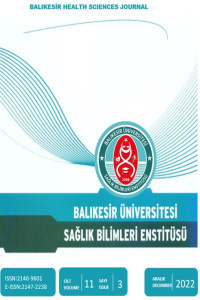COVID-19 Enfeksiyonu ve D Vitamini Düzeyleri Arasındaki İlişki
Covid-19, D vitamini, bağışıklık, düzeyi
The Relationship Between COVID-19 Infection and Vitamin D Levels
___
- -Prietl, B., Treiber, G., Pieber, T. R., & Amrein, K. (2013). Vitamin D and immune function. Nutrients, 5(7), 2502–2521. https://doi.org/10.3390/nu5072502
- - Battault, S., Whiting, S. J., Peltier, S. L., Sadrin, S., Gerber, G., & Maixent, J. M. (2013). Vitamin D metabolism, functions and needs: from science to health claims. European journal of nutrition, 52(2), 429–441. https://doi.org/10.1007/s00394-012-0430-5
- - Aranow C. (2011). Vitamin D and the immune system. Journal of investigative medicine : the official publication of the American Federation for Clinical Research, 59(6), 881–886. https://doi.org/10.2310/JIM.0b013e31821b8755
- - Holick M. F. (2007). Vitamin D deficiency. The New England journal of medicine, 357(3), 266–281. https://doi.org/10.1056/NEJMra070553
- - Beard, J. A., Bearden, A., & Striker, R. (2011). Vitamin D and the anti-viral state. Journal of clinical virology : the official publication of the Pan American Society for Clinical Virology, 50(3), 194–200. https://doi.org/10.1016/j.jcv.2010.12.006
- - Cui, C., Xu, P., Li, G., Qiao, Y., Han, W., Geng, C., Liao, D., Yang, M., Chen, D., & Jiang, P. (2019). Vitamin D receptor activation regulates microglia polarization and oxidative stress in spontaneously hypertensive rats and angiotensin II-exposed microglial cells: Role of renin-angiotensin system. Redox biology, 26, 101295. https://doi.org/10.1016/j.redox.2019.101295
- - Grant, W. B., Lahore, H., McDonnell, S. L., Baggerly, C. A., French, C. B., Aliano, J. L., & Bhattoa, H. P. (2020). Evidence that Vitamin D Supplementation Could Reduce Risk of Influenza and COVID-19 Infections and Deaths. Nutrients, 12(4), 988. https://doi.org/10.3390/nu12040988
- - Mendy, A., Apewokin, S., Wells, A. A., & Morrow, A. L. (2020). Factors Associated with Hospitalization and Disease Severity in a Racially and Ethnically Diverse Population of COVID-19 Patients. medRxiv : the preprint server for health sciences, 2020.06.25.20137323. https://doi.org/10.1101/2020.06.25.20137323
- - Manson, J. E., Brannon, P. M., Rosen, C. J., & Taylor, C. L. (2016). Vitamin D Deficiency - Is There Really a Pandemic?. The New England journal of medicine, 375(19), 1817–1820. https://doi.org/10.1056/NEJMp1608005
- - Holick, M. F., Binkley, N. C., Bischoff-Ferrari, H. A., Gordon, C. M., Hanley, D. A., Heaney, R. P., Murad, M. H., Weaver, C. M., & Endocrine Society (2011). Evaluation, treatment, and prevention of vitamin D deficiency: an Endocrine Society clinical practice guideline. The Journal of clinical endocrinology and metabolism, 96(7), 1911–1930. https://doi.org/10.1210/jc.2011-0385
- - Charoenngam, N., & Holick, M. F. (2020). Immunologic Effects of Vitamin D on Human Health and Disease. Nutrients, 12(7), 2097. https://doi.org/10.3390/nu12072097
- - Ingham T.R., Jones B., Camargo C.A., (2014). Association of vitamin D deficiency with severity of acute respiratory infection: A case-control study in New Zealand children. Conference: European Respiratory Conference 2014 At: Munich, (Eur. Respir. J. 2014;44:439.)
- - Sabetta, J. R., DePetrillo, P., Cipriani, R. J., Smardin, J., Burns, L. A., & Landry, M. L. (2010). Serum 25-hydroxyvitamin d and the incidence of acute viral respiratory tract infections in healthy adults. PloS one, 5(6), e11088. https://doi.org/10.1371/journal.pone.0011088
- - de Haan, K., Groeneveld, A. B., de Geus, H. R., Egal, M., & Struijs, A. (2014). Vitamin D deficiency as a risk factor for infection, sepsis and mortality in the critically ill: systematic review and meta-analysis. Critical care (London, England), 18(6), 660. https://doi.org/10.1186/s13054-014-0660-4
- - Vipul, P., Shuchi, C., Avinash, A., Manish, G., Sukriti, K., & Ved, P. (2017). Correlation of Serum Vitamin D Level with Mortality in Patients with Sepsis. Indian journal of critical care medicine : peer-reviewed, official publication of Indian Society of Critical Care Medicine, 21(4), 199–204. https://doi.org/10.4103/ijccm.IJCCM_192_16
- - Han, J. E., Jones, J. L., Tangpricha, V., Brown, M. A., Brown, L., Hao, L., Hebbar, G., Lee, M. J., Liu, S., Ziegler, T. R., & Martin, G. S. (2016). High Dose Vitamin D Administration in Ventilated Intensive Care Unit Patients: A Pilot Double Blind Randomized Controlled Trial. Journal of clinical & translational endocrinology, 4, 59–65. https://doi.org/10.1016/j.jcte.2016.04.004
- - Joo, M. H., Han, M. A., Park, S. M., & Shin, H. H. (2017). Vitamin D Deficiency among Adults with History of Pulmonary Tuberculosis in Korea Based on a Nationwide Survey. International journal of environmental research and public health, 14(4), 399. https://doi.org/10.3390/ijerph14040399
- - Chen, E. Q., Bai, L., Zhou, T. Y., Fe, M., Zhang, D. M., & Tang, H. (2015). Sustained suppression of viral replication in improving vitamin D serum concentrations in patients with chronic hepatitis B. Scientific reports, 5, 15441. https://doi.org/10.1038/srep15441
- - Gutierrez, J. A., Jones, K. A., Flores, R., Singhania, A., Woelk, C. H., Schooley, R. T., & Wyles, D. L. (2014). Vitamin D Metabolites Inhibit Hepatitis C Virus and Modulate Cellular Gene Expression. Journal of virology & antiviral research, 3(3), 10.4172/2324-8955.1000129. https://doi.org/10.4172/2324-8955.1000129
- ISSN: 2146-9601
- Yayın Aralığı: Yılda 3 Sayı
- Başlangıç: 2012
- Yayıncı: Balıkesir Üniversitesi
Zülfünaz ÖZER, Gülcan BAHÇECİOĞLU TURAN, Damla ÖZTÜRK
Fadime ÜSTÜNER TOP, Hasan Hüseyin ÇAM, Nilüfer İLYAS
Down Sendromu Tanılı Olgularda Aile ve Çocuğa Ait Sosyodemografik Özelliklerin Değerlendirilmesi
Serebral Palsi Hastasına Cerrahların Genel Yaklaşımı ile Güncel Literatürün Karşılaştırılması
Sağlık Okuryazarlığının Yaşam Kalitesine Etkisinde Özbakım Gücünün Aracı Rolü
Mahmut AKBOLAT, Mustafa AMARAT, Pelinsu Buket DOĞANYİĞİT
Kanser Hastalarında İki Yıllık Subkutan Venöz Port Kateter Deneyimimiz
SARS‐CoV‐2’nin Erkek Üreme Sistemi Üzerindeki Etkileri
Emine SARMAN, Kanat GÜLLE, Abdullah SARMAN
COVID-19 Salgınının Diş Hekimleri Arasında Yarattığı Korku ve Kaygının Değerlendirilmesi
Kurumsal İmajın Tavsiye Niyeti Üzerindeki Etkisinde Hasta Güvensizliğinin Aracı Rolü
